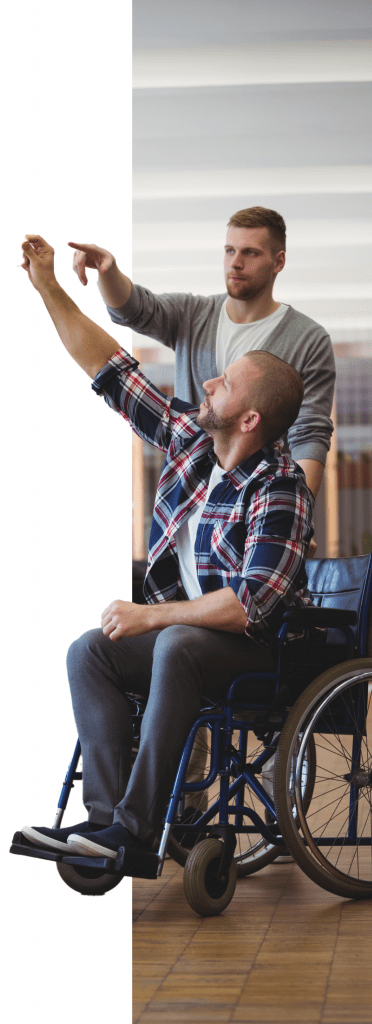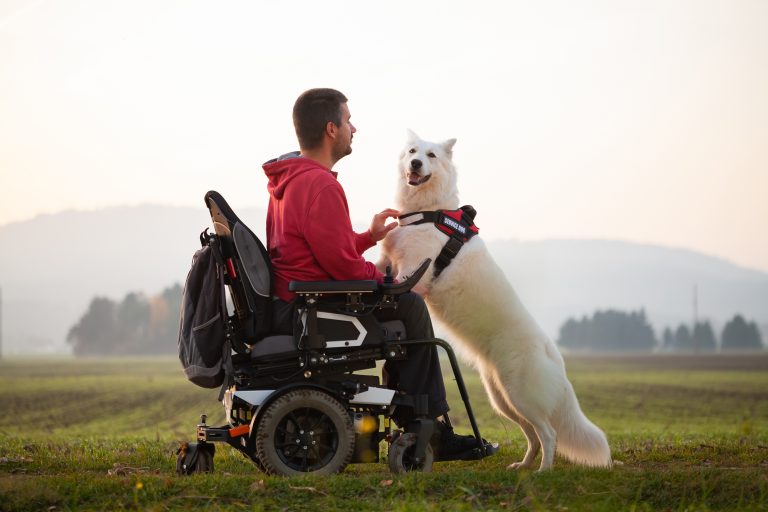Disability Careers Month
Pursuing a meaningful career is something most of us strive for in our lives. Individuals with disabilities are no exception to this. And individuals with disabilities that are also receiving services through a Medicaid waiver may encounter barriers in the pursuit of this goal, including Medicaid program or waiver qualifications that include income limits to determine financial eligibility. Medicaid buy-in programs offer a way for Medicaid beneficiaries to work while maintaining benefits to support their needs.
According to the US Department of Labor, “Medicaid ‘buy-in’ allows workers with disabilities access to Medicaid community-based services not available through other insurers. Nationally, workforce participation among people with disabilities is significantly lower than those without disabilities…Medicaid ‘buy-in’ breaks down barriers to employment for people with disabilities.”[1]
Working Healthy is an example of a Medicaid buy-in program. Sunflower Health Plan, a managed care organization, partners with Palco to provide this option to over 100 people with disabilities in the state of Kansas. “KS WORK (Work Opportunities Reward Kansans) is under our Medicaid buy-in program, Working Healthy,” says Cheryl Laaker, Manager of Community Engagement and Lead for the KS WORK program. “Working Healthy is specifically designed for people whose health care needs are significant but whose income exceeds the Medicaid limit. This category of Medicaid coverage is called ‘medically needy.’ People in this category only receive Medicaid health care coverage once they ‘spend down’ their extra income on medical expenses during a six-month period.”
Cheryl Laaker notes, “Spend-down is a major disincentive to employment, as the more individuals earn, the higher their spend-down becomes and the less likely they are to access Medicaid. Working Healthy, on the other hand, substitutes an affordable monthly premium in lieu of spend-down. This incentivizes employment by allowing people to increase their income without incurring higher spend-down or losing their eligibility for Medicaid coverage completely.”
With the KS WORK program, participants receive the necessary support to meet their daily needs as well as job support to include job coaching, assistive devices, and/or other supports that assure the participant will remain employed. “My favorite part about WORK is that the individual has budget authority,” Cheryl says. “It is a cash and counseling model where the individual is assessed for support needs and that equates to a dollar amount. The individual then gets to determine how to use that money to meet their support needs. For example, if they need transportation support, they can choose to use their money to buy bus passes or they can pay a personal care attendant (PCA) to drive them. This means that WORK participants have greater control and flexibility over the services that are critical for them to remain employed and living in their community.”

Carrie Greenwood is a KS WORK participant who exemplifies all that this program has to offer. Carrie has been an employee of the Kansas Youth Empowerment Academy (KYEA) for 22 years and is currently serving as a program coordinator. In her role as program coordinator, Carrie manages three different KYEA programs.
“I plan every detail of that program and then also help facilitate the program when it is hosted. I also do presentations a lot in my job about various disability and empowerment-related topics. I put together our quarterly newsletter, do most of our graphic design, and I supervise one of my co-workers.”
Carrie Greenwood, KS WORK participant

In addition to her work with KYEA, Carrie also serves as the chairperson for the Association of Youth Leadership Forums and is the vice-chairperson of the Kansas Disability Caucus. “I LOVE my job and our mission,” she says. “This job allows me to use my various skills to change the lives of youth with disabilities in our state. I am able to empower and support them, as well as serve as a role model for them. It can be a very busy job, but it is so worthwhile and a job where I am making a difference.”
Thanks to the KS WORK program, Carrie was able to accomplish a major goal in her life—being able to buy her own home and live on her own. “This was a goal that I had for a very long time,” she says. “I knew that I wanted to do it, but was just very nervous about everything that would be involved, especially being a person with a physical disability.” She continues, “I am a wheelchair user and need help with most daily personal care tasks like dressing, bathing, restroom, cooking, cleaning, etc. I had lived with my parents my entire life, and they had been the ones to provide my care on a daily basis for about 37 years. I had used PCAs for short amounts of time, but not on a daily basis.”
Through the KS WORK program, Carrie has been able to hire PCAs to assist with her daily living while living in her own home. “Moving out was the hardest thing that I have ever done,” she says, “But it continues to be worth it. Living on my own has increased my confidence, taught me communication and assertiveness skills, allowed me to test my problem-solving skills, and has even improved my social life! While it can be challenging at times, I am living the life that I want to live. I would not have been able to accomplish this huge goal without the KS Work program.”
The KS WORK program has also provided participant Kevin Olson the opportunity to work while maintaining Medicaid benefits.
“When I first became paralyzed in 1991, I was only 19 years old and I wanted to work. I was told that if I worked and earned any money at all that I would lose important benefits like insurance and caregiving. I am so glad that people have been able to see the importance of these types of programs. They add to my quality of life by allowing me to do meaningful work and feel good about earning some income.”
Kevin Olson, KS WORK Participant
In addition to being able to work from home building and maintaining websites for 20 years, Kevin has been able to speak at churches and schools. “Probably the most memorable experience that I have had while being enrolled in this program is being able to tell a friend about it,” Kevin says. “They were able to qualify and enroll also. It definitely improved their quality of life, as it did mine.”
Being in the KS Work program also allowed Kevin and his spouse to both continue working. “Both my income and my spouse’s income are used to determine eligibility for a lot of programs,” he says. “Together the Working Healthy program and the KS WORK program allow for both of us to work and support ourselves as much as we are able.”

Palco is proud to partner with organizations like Sunflower Health Plan and the KS WORK program to support individuals with disabilities in the pursuit of their workforce goals. October is National Disability Employment Month and we are proud to pay tribute to all men and women with disabilities have accomplished and the hard work necessary to keep our nation’s economy strong. Palco is committed to ensuring equal opportunities for all citizens.
[1] https://www.dol.gov/sites/dolgov/files/odep/topics/medicaidbuyinqaf.pdf

by Heather Nash
Account Manager







